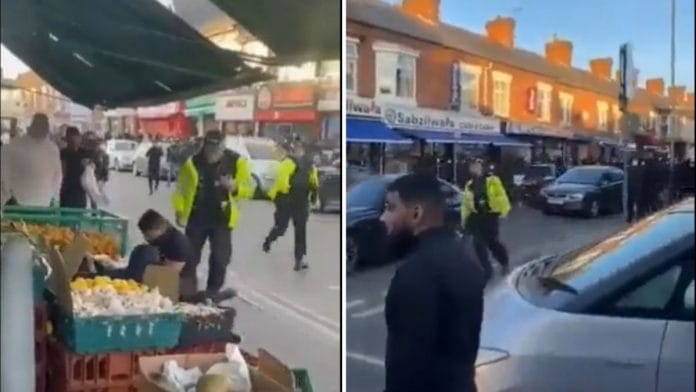The claims about Rashtriya Swayamsevak Sangh’s involvement in the Leicester communal clashes are designed to marginalise British Indians and cause anxiety among certain Muslim communities. However, its unintended by-product has made the RSS’s UK chapter relevant with the illusion of power.
Being both on the ground in Leicester and analysing the rhetoric within media spaces, a pattern in diaspora politics has become apparent. Unfortunately, well-meaning liberals get duped by the baseless claim that diaspora social unrest in foreign lands is orchestrated by the hidden hands of the Bharatiya Janata Party (BJP) and the RSS. Spreaders of such myths, especially the Islamists and their allies, try to trick the international audience by equating the communal violence in India with Indian diaspora affairs.
There is a proliferating perception in certain Anglosphere circles that the BJP, RSS, and Hindutva are all synonymous with intolerance and incompatible with polite society. This caricature and simplification of Indian politics is widespread across the mainstream Anglosphere. Extremists take it one step further and use ‘BJP and RSS’ as a slur, imposing it on people who are fair game for abuse and marginalisation.
Furthermore, this ‘slur’ is used to fan the flames of fear and outrage in the Muslim community. For example, author Amrit Wilson made the baseless statement that “coach loads of RSS supporters went to Leicester”. Such incendiary comments are purposely designed to increase tensions in diaspora communities.
Also read: 5G is coming to India next month. Should you upgrade?
Dangers of misinformation
As per conversations with the police, evidence from think tanks, and the Labour Party’s India Group, there is zero evidence which links the violence in Leicester to the RSS.
In reality, vested interests spun an India vs Pakistan cricket match into a Hindu vs Muslim issue, scapegoating the local Daman community composed of both Hindus and Christians. I have engaged with the Daman community members who were involved in both the cricket-match brawl of 30 August and the protest march of 17 September and who said that they didn’t even know what Hindutva and RSS are. Moreover, they are mostly of humble means, blue-collar workers who have been exploited by misinformation enthusiasts who want to paint them as RSS agitators. Not knowing how it would be misconstrued, they shouted Jai Shri Ram and Vande Mataram in response to hearing Allahu Akbar during the 17 September protest march.
As the Leicestershire Police pointed out, fake news is contributing to the already growing social tensions. The widespread misinformation can be categorised into three underlying themes, all of which are incorrect:
a) Multiculturalism has failed in the UK, specifically in Leicester
b) All Indian diaspora activism, expression, and acts of protest are controlled by the BJP/RSS
c) All Muslims are complicit in a conspiracy to target Hindus
There are legitimate cases of Hindu extremism in India but this being a significant problem in the UK is baseless. It is bewildering that any form of diaspora activism gets accused of being affiliated with Hindutva, particularly without evidence. This ‘slur’, akin to calling someone racist in certain circles, is used to shut down debate and to marginalise.
Such nefarious politics is primarily used to spoil UK-India relations by conjuring up the image of Indian interference in the UK. The forces behind it want to splinter British Indian expression with the intention of oppressing one community so that others may flourish. This perception of success at the cost of one community is incredibly myopic and ultimately hurts everyone in the process.
Also read: Rumours swirl about coup against President Xi Jingping. Wishful thinking, say China experts
Perception of power
Many are wondering why the RSS has not immediately called the narrative out. It’s because this narrative of ‘RSS control’ works for the organisation. To an Indian audience, this ‘anti-hero’ or ‘bogeyman’ image creates a perception of power and the ability to run on-ground activities in different countries.
Moreover, it creates the perception that the RSS is the most powerful group among the diaspora, that they can get things done, which in turn attracts people to them. In reality, the amount of free publicity the RSS gets creates a mystique, which prevents centrist/moderate diaspora movements from taking shape.
There is a very small RSS organisational presence in the UK, and it is loving this opportunity because it makes the RSS relevant and shows its ‘worth’ to those in India. Paradoxically, some who identify as ‘left’ keep harping on about the RSS/BJP ‘bogeyman’ because they do not wish these groups to gain traction in the UK when, in reality, it has the opposite effect. By attacking and marginalising the British Indian community, they will push the community to a strong and seemingly authoritative influence.
Arun Singh is a British Indian researcher with a specialisation in integration and counter-extremism. Views are personal
(Edited by Ratan Priya)







If the author had stated when the RSS last criticized the narrative being spread by Islamists or Leftists, that would have been great. They always keep to themselves and operate in the background. I think the author has fallen into the same bogeyman trap and is unclear about the RSS.